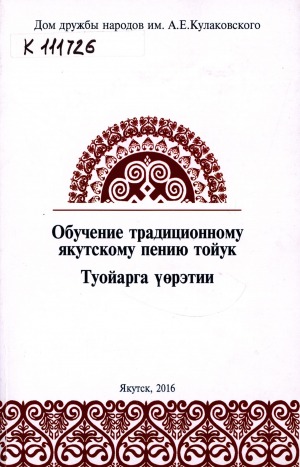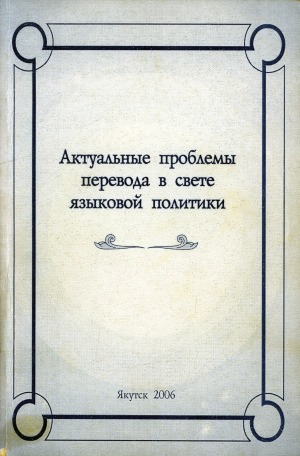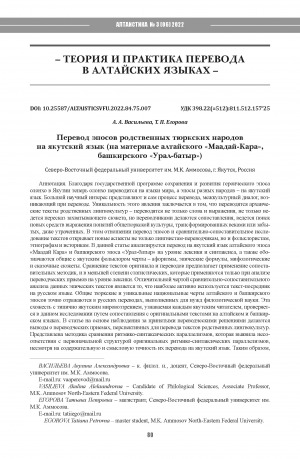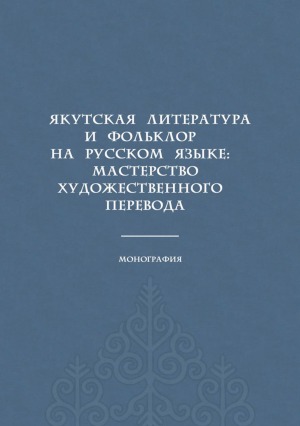
Место работы автора, адрес/электронная почта: Северо-Восточный федеральный университет им. М. К. Аммосова, Институт языков и культуры народов Северо-Востока РФ ; 677013, г. Якутск, ул. Кулаковского, 42 ; e-mail: aal.vasilieva@s-vfu.ru, vaaperevod@mail.ru ; www.s-vfu.ru
Ученая степень, ученое звание: канд. филол. наук
Область научных интересов: Теория и практика перевода, художественный перевод, история перевода
Деятельность: С 1996 г. работает в ЯГУ.
Количество страниц: 14 с.
- Языкознание. Филология. Художественная литература > Языкознание и языки. Лингвистика > Якутский (саха),
- Языкознание. Филология. Художественная литература > Языкознание и языки. Лингвистика > Русский язык,
- НАУКА ЯКУТИИ > ЯЗЫКОЗНАНИЕ. ФИЛОЛОГИЯ. ЛИТЕРАТУРОВЕДЕНИЕ. ХУДОЖЕСТВЕННАЯ ЛИТЕРАТУРА > Языкознание и языки. Лингвистика.
The article analyzes errors of web translators Google Translate and Yandex Translate in the Yakut-Russian language pair in three texts of different genres. The Yakut language was introduced to webtranslators several years ago, and their mainstream use is at an early stage. Analyzing machine translation in the Yakut-Russian language pair can contribute to the development of recommendations for the effective training of both machine systems and human translators, primarily in machine translation post-editing. Thus, the classification of machine translation errors in this article is relevant in the current development stage of the Yakut-Russian theory and practice. For the experiment’s purposes, the following texts were translated via the specified services: a) an excerpt from a scientific paper in Russian; b) an excerpt from a translation of the Bible into Yakut (reverse translation into Russian); c) a poem in Yakut on morality. The classification of machine translation errors in this language pair is based on typologies of other language pairs: a) lexico-semantic and lexico-stylistic errors; b) errors in standards and usage; c) grammar errors; d) spelling errors; e) punctuation errors. The nature of errors is described and the reasons for their occurrence are explained. The main causes of errors are: a) the difference in the volume of initial data in the machine systems for analyzing the language of the text being translated; b) the special nature of similarities and differences of contacting languages, associated with polysemanticity and grammar gaps. Upon comparing the quality of translations of both services, their strengths and weaknesses in translation with the Yakut language are noted. The article concludes that the linguistic databases of these services need improvements, and human translators who work with the Yakut-Russian language pair need to acquire corresponding expertise.
Васильева, А. А.
Анализ ошибок машинного перевода текстов разных жанров в паре "русский и якутский языки" / А. А. Васильева, О. В. Бурцева ; Северо-Восточный федеральный университет им. М. К. Аммосова // Вестник Северо-Восточного федерального университета им. М. К. Аммосова. Серия "Алтаистика". - 2025, N 2 (17). - С. 39-52. - DOI: 10.25587/2782-6627-2025-2-39-52
DOI: 10.25587/2782-6627-2025-2-39-52
Количество страниц: 14 с.
The article presents the results of the survey of the population of Yakutsk (the capital of the Sakha Republic) on the implementation of the requirements of articles 12-18 of the Law on Languages in the Sakha Republic, in effect since 1992. These articles concern the use of the republic’s state and official languages in official communication. The survey was conducted among two groups of respondents: 1) government and municipal employees responsible for implementing the state status of the Sakha language; 2) the capital’s residents of different social strata who experience the effects of the language policy of the republican authorities. The responses received were analyzed using statistical analysis methods, and the public opinion on the quality of implementation of the requirements of the Law on Languages in the Sakha Republic was determined, including the language of meetings in organizations, the language of legislative acts of republican and local authorities, the language of office administration, the language of communication between citizens and authorities, etc. As a result of this analysis, it was concluded that the Sakha language has a very narrow application in state and municipal administration - it is mainly the language of informal communication. Translation activities aimed at ensuring equal use of both state languages are not well organized. Some articles of the law concerning office administration in the Sakha language have lost their relevance due to the development of technologies and standards, including systems for the automated circulation of financial and statistical documentation. According to the author of the article, the main reason for the failure to comply with the requirements of the Law on Languages in the Sakha Republic in state and municipal administration is the widespread Yakut-Russian bilingualism, which entails the transition to Russian by a significant number of bilinguals and the lack of targeted measures to support the state status of the Sakha language from the republican authorities.
Васильева, А. А.
Язык саха в сфере государственного и муниципального управления глазами служащих и населения г. Якутска Республики Саха (Якутия) / А. А. Васильева ; Северо-Восточный федеральный университет им. М. К. Аммосова // Вестник Северо-Восточного федерального университета им. М. К. Аммосова. - 2025. - Т. 22, N 1 (99). - С. 61-74. - DOI: 10.25587/2222-5404-2025-22-1-61-74
DOI: 10.25587/2222-5404-2025-22-1-61-74
Количество страниц: 12 с.
- Языкознание. Филология. Художественная литература > Языкознание и языки. Лингвистика > Якутский (саха),
- Языкознание. Филология. Художественная литература > Языкознание и языки. Лингвистика > Русский язык,
- НАУКА ЯКУТИИ > ЯЗЫКОЗНАНИЕ. ФИЛОЛОГИЯ. ЛИТЕРАТУРОВЕДЕНИЕ. ХУДОЖЕСТВЕННАЯ ЛИТЕРАТУРА > Языкознание и языки. Лингвистика.
Based on the analysis of a large volume of translations of texts of different styles and genres, this article formulates the principles and guidelines for establishing rules for transcription and transliteration in Russian of specific sounds and letters of the Yakut language. The relevance of the study lies in the fact that the current rules for the transcription of geographic names were approved half a century ago in the “Instructions for the Russian translation of geographical names of the Yakut ASSR”. With the exception of cartography and reference books of the administrative and territorial structure of the republic, they are not observed anywhere. In this regard, there is a need to revise these rules, taking into account the vast translation experience and achievements of Yakut linguistics, to approve new rules, and to develop mechanisms for state and public control over their observance. The article defines the difference between transcription and transliteration in the case of common alphabets of the contacting languages; formulates the principles of transmitting specific sounds of the Yakut language via transcription and transliteration by means of the Russian language; and develops guidelines in accordance with the formulated principles. In the first part, the article provides a brief overview of the current legal acts governing the spelling of Yakut geographical and personal names. It also briefly analyses the linguistic foundations of the current rules set out in the Instructions. In addition, the article describes the results of the analysis on transcribing Yakut non-equivalent vocabulary in different years by different teams of translators. These are the translations of 12 olonkho, the historical novel “Remote Vilyui” by Vasily Dalan, as well as the material collected in the reference books of borrowed words by Professor Nikolay Samsonov. While writing this article, the author relied on the provisions of the general theory of translation developed by professor Dmitry Ermolovich and set out in his monograph, and also refers to the results of research by Yakut phoneticians Dyachkovsky and Alekseev, methodologists Samsonova and Dmitrieva. The principles established in this article and the recommendations developed on their basis for the translation of specific sounds of the Yakut language into Russian, in the author’s opinion, will contribute to the preservation of the historical memory of the Sakha people because they translate with the most care the graphic appearance of the original word in the context of the common alphabets of the contacting languages.
Васильева, А. А.
Принципы и правила передачи на русский язык специфических звуков якутского языка / А. А. Васильева ; Северо-Восточный федеральный университет имени М. К. Аммосова // Вестник Северо-Восточного федерального университета им. М. К. Аммосова. Серия "Алтаистика". - 2024. - N 4 (15). - С. 73-84. - DOI: 10.25587/2782-6627-2024-4-73-84
DOI: 10.25587/2782-6627-2024-4-73-84
Количество страниц: 13 с.
- Языкознание. Филология. Художественная литература > Языкознание и языки. Лингвистика,
- Языкознание. Филология. Художественная литература > Литература. Литературоведение,
- НАУКА ЯКУТИИ > ЯЗЫКОЗНАНИЕ. ФИЛОЛОГИЯ. ЛИТЕРАТУРОВЕДЕНИЕ. ХУДОЖЕСТВЕННАЯ ЛИТЕРАТУРА > Языкознание и языки. Лингвистика,
- НАУКА ЯКУТИИ > ЯЗЫКОЗНАНИЕ. ФИЛОЛОГИЯ. ЛИТЕРАТУРОВЕДЕНИЕ. ХУДОЖЕСТВЕННАЯ ЛИТЕРАТУРА > Литература. Литературоведение.
Based on the semiotic models of Juri Lotman, this article regards a literary text as an interaction of semiospheres and its translation as a conversion from one cultural code to another. The article gives key takeaways from the conducted analysis of the three texts of Chinghiz Aitmatov’s novel “The First Teacher” - the original in the Kyrgyz language, the author’s translation into the Russian language, and the translation into Yakut language. Several semiospheres are unraveled in the two author’s texts which both are the originals for the Yakut translation - the Kyrgyz semiosphere K, the Muslim semiosphere M, the Soviet semiosphere S (with three periods - S60, S20, and S50), the universal (common to all mankind) semiosphere Cho, and the Russian semiosphere RO. For the Yakut translator Nikolai Kondakov, the original text is the author’s translation into the Russian language, which, compared to the Kyrgyz text, contains more of the Soviet semiosphere S and has the Russian semiosphere RO familiar to all linguocultures of the people of the USSR. The article provides examples of translation into the Yakut language contextual culture-specific elements and linguoculturemes of the Kyrgyz semiosphere K, as well as idioms of the Russian semiosphere RO. The analysis concludes that the Yakut translation didn’t relay the author’s and the Kyrgyz linguoculture’s specific meaning to the full extent. Instead, the translation is transformed into a text of the Yakut semiosphere. Several reasons for this transformation are denoted - subtle differences in the expression of common Turkic concepts in related linguocultures and the personal skill of the Soviet journalist-turned-translator who tries to loan translate not only Russian idioms but also the syntax of many sentences. It is concluded that it is important to conduct a pre-translation analysis of the original with a careful review of all implicit and explicit linguocultural aspects of the text. This allows the correct translation strategy of a literary text from a related culture.
Попова, А. Н. Семиотический анализ текстов родственных лингвокультур в переводоведческом ракурсе (на материале якутского перевода повести Чингиза Айтматова "Первый учитель") / А. Н. Попова, А. А. Васильева ; Литературный институт им. А. М. Горького, Северо-Восточный федеральныйуниверситет им. М. К. Аммосова // Вестник Северо-Восточного федерального университета им. М. К. Аммосова. Серия "Алтаистика". - 2024, N 3 (14). - C. 68-80. - DOI: 10.25587/2782-6627-2024-3-68-80
DOI: 10.25587/2782-6627-2024-3-68-80
Издательство: РИО ДДН им. А. Е. Кулаковского
Год выпуска: 2016
Количество страниц: 80 с.
Издательство: Институт гуманитарных исследований РС(Я)
Год выпуска: 2006
Количество страниц: 162 с.
Количество страниц: 3 с.
Павлова, Е. П. Этнополитическое образование молодежи в системе патриотического воспитания / Е. П. Павлова, Г. М. Парникова, А. А. Васильева ; Северо-Восточный федеральный университет имени М. К. Аммосова // Глобальный научный потенциал. – 2019. – N9 (102). – С. 20-22.
Количество страниц: 12 с.
Васильева, А. А. Перевод эпосов родственных тюркских народов на якутский язык (на материале алтайского "Маадай-Кара", башкирского "Урал-батыр") / А. А. Васильева, Т. П. Егорова // Вестник Северо-Восточного федерального университета им. М. К. Аммосова. Серия "Алтаистика" - 2022. - N 3 (6). - С. 80-91.
DOI: 10.25587/ALTAISTICSVFU.2022.84.75.007
Издательство: ИЦ НБ РС (Я)
Год выпуска: 2022
Серия, номер выпуска: Электронные издания Национальной библиотеки Республики Саха (Якутия)
Количество страниц: 156 с.
Количество страниц: 12 с.
- Языкознание. Филология. Художественная литература > Языкознание и языки. Лингвистика > Якутский (саха),
- Искусство. Фотография. Музыка. Игры. Спорт > Музыка,
- Языкознание. Филология. Художественная литература > Языкознание и языки. Лингвистика > Русский язык,
- НАУКА ЯКУТИИ > ЯЗЫКОЗНАНИЕ. ФИЛОЛОГИЯ. ЛИТЕРАТУРОВЕДЕНИЕ. ХУДОЖЕСТВЕННАЯ ЛИТЕРАТУРА > Языкознание и языки. Лингвистика,
- НАУКА ЯКУТИИ > ИСКУССТВО. ФОТОГРАФИЯ. МУЗЫКА. ИГРЫ. СПОРТ > Музыка.
Васильева, А. А. Народные термины музыкального искусства якутов в научных текстах на русском языке / А. А. Васильева, С. А. Ховрова // Вестник Северо-Восточного федерального университета им. М. К. Аммосова. – 2022. – N 1 (87). – С. 44-55
DOI: 10.25587/SVFU.2022.57.11.005









